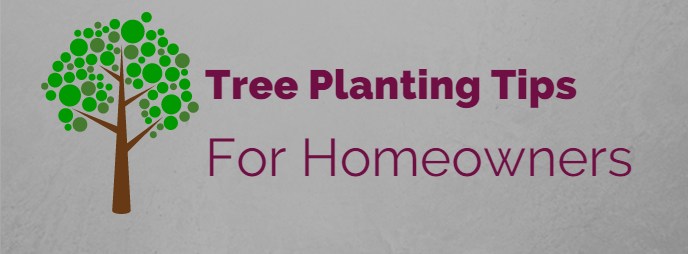
Wanting to amp up your landscaping? Planting trees in your yard will yield a multitude of benefits, including shading your house, decreasing energy costs, curb appeal, improvement of the quality of air you breathe, and more! The best part is, trees are low-maintenance once planted and can help improve your home’s property value. Check out the tree planting tips below help you get started.
Where to Plant Trees: Where you plant trees on your property can affect a variety of things. Houselogic.com suggests the following tips to guide you.
-
Plant deciduous trees on the west side of your house for shade in the summer and to let the heat in the winter. Deciduous trees are trees that shed their broad leaves seasonally, such as the fall months.
-
Use evergreen trees on the north side of your home. These thick-branched trees keep their needles all year long, blocking icy winds from the north in the winter.
-
If you are planting trees decoratively, make sure to avoid planting below power lines. As trees grow taller, branches can become entangled in the lines. Furthermore, broken branches can fall into the lines causing power outages and potentially harmful electrical conditions.
-
Plant trees a safe distance away from your home’s foundation. When trees mature, roots can grow into the foundation, causing expensive and unsafe problems.
What to Plant: Better Home and Gardens recommends the variety of trees below to suit your tree-planting needs.
-
Decorative Trees- If it’s beauty you are looking for, the following trees may be idea for your landscape and curb appeal: Japanese Maple, Crabapple, Redbud, or Weeping Cheery
-
Shade Trees- Seeking trees to nap under or shade your home? Check these options out: Honey Locust, Willow Oak, Northern Red Oak, Freeman Maple, or Slippery Elm
-
Conifers- Love conifers? Want to block those cold winds? The following options might work for you: Arborvitae, Pine, or Spruce
How to Plant: Depending on the tree you purchase, the ways in which you need to plant your tree will vary. The Arbor Day Foundation provides specific instructions for the following types of trees.
-
Bare Root trees come as they sound- with their bare roots exposed and ready for the ground. These trees dig into the ground quicker once planted effectively.
-
Containerized trees are small trees that are rooted into a container. Planters loosen the dirt from the container and plant the soil and tree directly into the ground.
-
Balled and Burlaped trees are trees with roots wrapped in wire and burlap. Once in the ground, the burlap is cute loose for roots to freely breathe and plant.
Planting the right trees for your home is worth the while. Visit your local nursery today and begin soaking up the benefits of beautiful trees as soon as you can.
